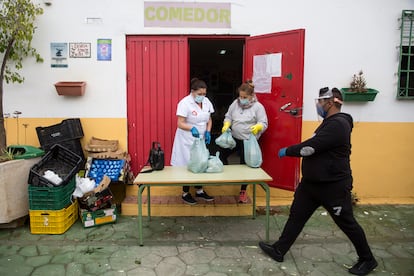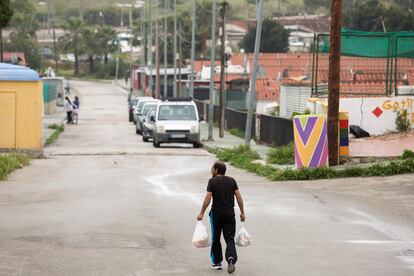Coronavirus crisis leaving entire families in Spain without work
The number of households with no working members has risen to 1.14 million due to the Covid-19 pandemic. EL PAÍS spoke with three people in this situation

Last fall, Adelaida Román’s month-long contract as a waitress at Málaga’s Holiday Inn was extended due to her impeccable work ethic, not to mention a profitable tourist season. She was on a salary of €750 a month for a reduced schedule, but for this 34 year old, the money was a godsend. At last, she had some stability in her life and the chance to feel optimistic about the future. “The hours also made it easy for me to take my three children to school,” she explains.
But with the coronavirus crisis, she was back to square one. The pandemic devastated the Spanish tourism industry, and she, like thousands of others, lost her job. “My husband is sick and can’t work, so it was the only income we had,” she says, adding that she wasn’t able to get on the ERTE furlough scheme because she hadn’t paid enough social security. Now, when she thinks of the future, she feels anxious and concerned, especially for her children who are four, eight and 12 years old.
On a psychological level, everything falls apartPsychologist Isabel Aranda
Spain’s gross domestic product (GDP) fell by 18.5% in the last quarter and, according to the latest workforce survey (EPA), the number of Spanish households with all their active members out of work rose in the second quarter of the year to 1.14 million, up from 992,000 in the same period in 2019. The report also indicates that there are 670,000 families with no income, the highest figure since the second quarter of 2016 and barely 100,000 less than the record set at the end of 2013, when the 2008 economic crisis had its biggest impact on employment.
The statistics are startlingly negative, despite the support provided by the government for the self-employed and the ERTE furlough scheme, which has given thousands of workers an income while their jobs have been suspended. “The data also includes as inactive the unemployed who were unable to seek work during the lockdown,” says Luis Ayala, professor of applied economics at the National University of Distance Education (UNED) and a specialist in redistribution, social policy and markets. This means the total number unemployment figure is likely to be much higher. “The data for the next quarter will probably be bad – very bad, although it will also reflect the economy’s revival.”
Ayala says that the health crisis has strengthened informal community support networks – between neighbors, relatives and associations – as well as more formal ones, particularly with the introduction of the guaranteed minimum income scheme. But despite these improvements, he believes regional authorities and city councils need to do more.
The economist explains that Spain’s labor market was already suffering from precarious conditions, with the rise of temporary contracts and reduced hours – a situation that has been exacerbated by the Covid-19 crisis. Ayala warns that the rise in the number of households with all members unemployed, and worse, without an income, will lead to “greater extreme poverty and a significant increase in inequality.” Around 2.2 million people in Spain currently live in extreme poverty, according to a survey published in July by the National Statistic Institute (INE).
Román, the waitress from Málaga, receives just €190 as a guaranteed minimum income as it takes into account her salary in 2019. “But now is when I need it the most,” she says. “Because there is also the difficulty of finding work.” She can hardly bear to recall the coronavirus lockdown, which forced her in the end to accept food from different private and public entities operating in her neighborhood, Los Asperones.

Uncertainty and fear
“It was a very difficult time,” says Meritxell Moñino, who, like her husband, lost her job. “You see that you have no income, and you feel an enormous amount of uncertainty and a lot of fear.” Bringing up their two daughters, aged seven and 13, in La Algaba, north of Seville, the couple also had to resort to food donations – in their case from Save the Children, which offered ongoing support both economically and psychologically.
Before the state of alarm was declared, Moñino, 33, was working as a cleaner and her husband, Pedro Pérez, as a handyman. Neither was given a contract and during the lockdown, they were left without any income. “The families were afraid of the virus; of people coming into their homes and from one day to the next, I was out of a job,” she says, referring to the houses she cleaned. The same thing happened to her husband.
“We are very worried about the future now because people are still afraid of the disease and the economy is getting worse,” she says, adding that she hope people will act responsibly to prevent new coronavirus outbreaks, like the one detected in her area.
Cristina Álvarez, 53, doesn’t have it easy either. She arrived in Málaga from Colombia in May 2019 to look for a job and send money back home to her family. She had a work permit and it didn’t take her long to find a job. On August 1 last year, she began to look after an 89-year-old woman with Alzheimer’s disease. The state of alarm meant that they went into lockdown together and the woman’s family, who had employed Álvarez without a contract, did not allow her to go out or do the shopping. This meant she had no downtime and ended up looking after the woman 24/7. Álvarez says she was not allowed to make video calls and that security cameras were installed in the house. “I left. I couldn’t let them violate my rights, not only as a worker, but also as a human being,” she says.
We are very worried about the future now because people are still afraid of the disease and the economy is getting worseMeritxell Moñino, who lost her job as a cleaner during the lockdown
With her savings spent, Álvarez now lives with a Spanish friend who has given her a room in his house. On July 16, she found a job taking care of another woman, who died shortly afterwards. “And I haven’t been paid yet,” she says. “It is a complicated time with the whole issue of the funeral, so, you know, it’s not the time to ask for the money. At times I get desperate, but things are difficult just now. We just have to keep looking for opportunities.”
“Hope” is the word that psychologist Isabel Aranda uses most often to talk about the current situation of Spain’s labor market. She knows that the situation is complicated, but says that people must look to the future. The expert, who is the spokesperson of the Madrid Psychology Association, says the number of private and public consultations “increased dramatically” during the pandemic, which has been “a heavy blow” for many people.
Aranda says that when all the members of a family lose their jobs, particularly if it happens simultaneously, they lose their sense of security. “On a psychological level, everything falls apart,” she explains.
The feeling of failure is acute, generating stress, anxiety, despair and a loss of hope, something that is also transmitted to their children. “The worst thing that can happen is that resignation sets in since this generates a learned state of helplessness – a state where the feeling there is no way out ends up affecting the person not only psychologically but also physically,” she says.
To avoid this, Aranda recommends sharing what you feel, asking for help and looking towards the future. “We have to be realistic, but we also have to think that there is a lot of social support now and that, sooner or later, the situation will change,” she says.
English version by Heather Galloway.
Tu suscripción se está usando en otro dispositivo
¿Quieres añadir otro usuario a tu suscripción?
Si continúas leyendo en este dispositivo, no se podrá leer en el otro.
FlechaTu suscripción se está usando en otro dispositivo y solo puedes acceder a EL PAÍS desde un dispositivo a la vez.
Si quieres compartir tu cuenta, cambia tu suscripción a la modalidad Premium, así podrás añadir otro usuario. Cada uno accederá con su propia cuenta de email, lo que os permitirá personalizar vuestra experiencia en EL PAÍS.
¿Tienes una suscripción de empresa? Accede aquí para contratar más cuentas.
En el caso de no saber quién está usando tu cuenta, te recomendamos cambiar tu contraseña aquí.
Si decides continuar compartiendo tu cuenta, este mensaje se mostrará en tu dispositivo y en el de la otra persona que está usando tu cuenta de forma indefinida, afectando a tu experiencia de lectura. Puedes consultar aquí los términos y condiciones de la suscripción digital.









































